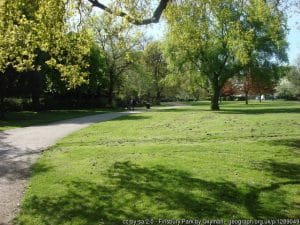Support us from £3/month
We deal with almost 1000 cases a year assisting communities, groups and individuals in protecting their local spaces and paths in all parts of England and Wales. Can you help us by joining as a member?
We are disappointed that the Court of Appeal has upheld the use of London parks for major ticket-only entertainments.
In its judgment today,(1) the court finds that Haringey borough council acted lawfully in hiring out part of Finsbury Park for the purposes of a major entertainment event, the Wireless Festival, in 2016.(2)
The court rejected the claims of the appellant, the Friends of Finsbury Park, and of the society (which received permission to be heard by the court), that the council’s primary duty was to hold the park in trust for public recreation, and that facilitating a major event, to the exclusion of the public generally, was a breach of that trust.
The court found that section 145 of the Local Government Act 1972, in conferring a power on all local authorities to ‘enclose or set apart any part of a park’ for the provision of entertainment, implied that Haringey could exclude the public for the purposes of setting up and breaking down the event infrastructure in the periods leading up to and following the performances.
The society contended that the Greater London Parks and Open Spaces Act 1967, which confers uniform powers on London borough councils to facilitate recreation in the capital’s open spaces, was a special régime for Greater London which overrode the general provisions in section 145 of the 1972 Act.(3) But the court said that the two statutes were complementary, and the council could act under either.
Speaking today, Hugh Craddock, one of the society’s case officers, said: ‘It is hugely disappointing that the court has upheld the power for London councils to hold major events in their public parks. Some councils have acted as if their parks were their own private land, and rented them out to maximise revenue. With that has come maximum disruption for park users seeking quiet recreation, a place to walk the dog, or just an opportunity to reflect.’
Commenting on the court’s finding that London borough councils are not bound to act within the terms of the 1967 Order,(4) Hugh said: ‘London local authorities have long seen the 1967 Order as the basis for managing recreation in all of their open spaces. The decision of the court leaves uncertain whether the 1967 Order still has a role, and if so, in relation to which open spaces.’
‘We are grateful to Richard Buxton Environmental & Public Law, and to George Laurence KC and Ross Crail of New Square Chambers, for their work for the society as intervener in the appeal. With them, we shall consider the judgment carefully and reflect on whether an appeal is called for.’
1 R (on the application of the Friends of Finsbury Park) v Haringey London Borough Council, Festival Republic Ltd and Live Nation (Music) UK Ltd (the Open Spaces Society intervening)
2 The Wireless Festival has been held in Finsbury Park since 2014. In 2016, the event called for closure of part of the park for three weeks (although part of the closure was rescinded because of a cancellation), and on performance days, 27% of the park was closed to the public.
3 The society argued before the court: generalia specialibus non derogant—a general provision does not derogate from a special one, ie that the 1967 Order was ‘special’ legislation for London, and was not undermined by s.145 of the Local Government Act 1972. The court decided that the 1967 Order and section 145 had different, if overlapping purposes, and that there was no derogation of one from the other
4 The 1967 Order was confirmed by the Ministry of Housing and Local Government Provisional Order Confirmation (Greater London Parks and Open Spaces) Act 1967.

